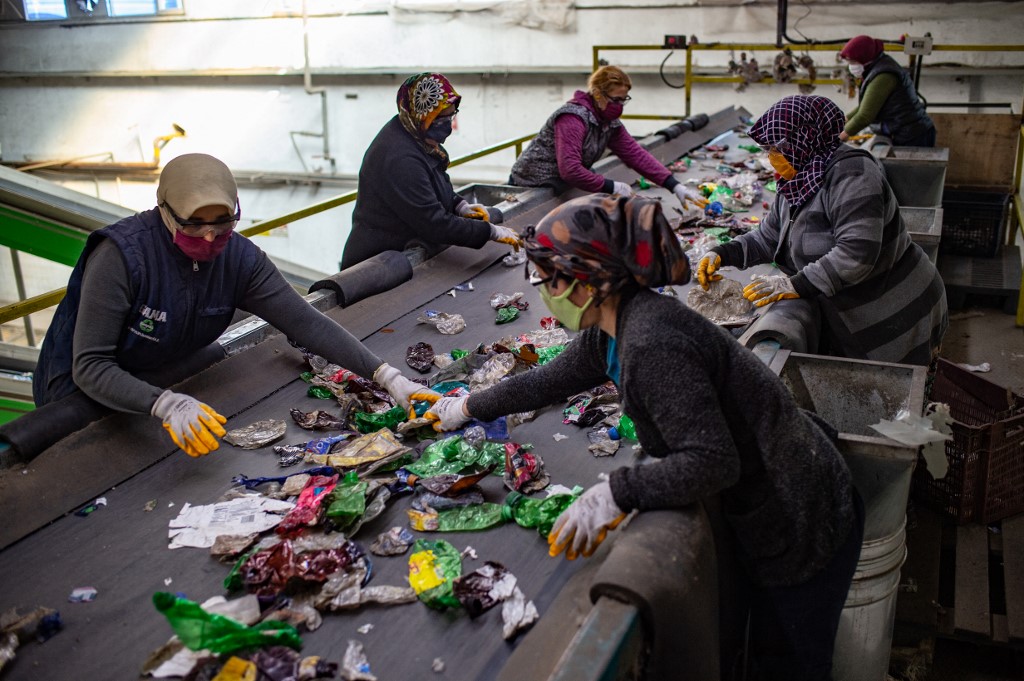A report drafted by the DİSK/Genel-İş union’s Labor Studies (EMAR) on the occasion of March 8, International Women’s Day, has revealed that only three out of every 10 women in Turkey are in the workforce.
EMAR’s Women’s Labor Report March ’24, released on Thursday, aims to draw attention to overlooked issues regarding women’s participation in the workforce. The report highlights that women in Turkey are forced to choose between a source of “cheap labor” and “sanctified motherhood.”
Turkish President Recep Tayyip Erdoğan, whose government is accused of limiting the civil liberties of women, frequently comments on a variety of topics related to women in Turkey, including their role in society and how many children they should have.
He once described the women who choose careers over motherhood as “incomplete” and “half-persons.”
According to the report, there is a 34.6 percent gap between men and women employed in the country.
According to the Turkish Statistical Institute (TurkStat), narrowly defined unemployment refers to individuals aged 15 and above who were not employed during the reference period, actively searched for a job through at least one job-seeking channel in the past four weeks and were ready to start work within the next two weeks, while broadly defined unemployment also includes those who have lost hope of finding a job, are not actively seeking employment but are ready to work, seasonal workers and those with time-related underemployment.
Female unemployment in Turkey is more than twice that of EU and OECD member countries, the report said, adding that the number of women unemployed under the broad definition is around 4.5 million.
The report also showed that nearly 12 million women cannot participate in the workforce due to family and personal reasons in addition to household chores.
While 30.8 percent of employed women in Turkey are working in the informal sector as unregistered workers, over 3 million women lack social security coverage, according to the report.
EMAR stated in its conclusion that all forms of discrimination against women in the workplace should be eliminated and that efforts should be made to end flexible working arrangements, gender-based division of labor and wage inequality. It added that full-time and secure employment opportunities should be created for women and their working hours reduced.
Most women in Turkey are ‘unhappy’
Meanwhile, the Ankara-based MetroPoll on Thursday shared statistics from 2023 about women in Turkey, saying that 60.4 percent said they were “unhappy” in an August survey. A total of 49.2 percent of men described themselves as unhappy in the same period.
Kadınlarımızın %60’ı mutsuz olduğunu ifade ediyor. Bu şartlarda huzurlu bir toplumu nasıl üreteceksiniz? pic.twitter.com/7cxGipgX7I
— MetroPOLL Araştırma (@metropoll) March 7, 2024
While 48.2 percent of women in Turkey said in the same survey that they need psychological support, men saying they don’t need such support constituted 63.2 percent of respondents.
Kadınlarımızın yarısı psikolojik desteğe ihtiyaç duyduğunu belirtiyor. pic.twitter.com/NhmD0xRQNb
— MetroPOLL Araştırma (@metropoll) March 7, 2024
The results of a Metropoll survey from March also showed that 37.1 percent of respondents rank violence as the most serious problem facing women in the country, followed by unemployment (11.3 percent), lack of education (21.8 percent), harassment and pressure in the street (12.7 percent) and pressure from family/relatives (8.2 percent).
Türkiye’de kadınlarımızın en önemli sorunları. Bir numaralı sorun giderek artan kadınlara yönelik şiddet. Son bir asırda kadınlara yönelik aleni şiddet hiç bu kadar artmamıştı. Ve etkili bir tedbir alınamıyor. pic.twitter.com/dpYJesDkAj
— MetroPOLL Araştırma (@metropoll) March 7, 2024
Thirty-six women were murdered by men in Turkey in February, and 17 more died under suspicious circumstances, according to data from the We Will End Femicide Platform.
Femicides and violence against women are chronic problems in Turkey, where women are killed, raped or beaten almost every day.
Many critics say the main reason behind the situation is the policies of the Justice and Development Party (AKP) government, which protects violent and abusive men by granting them impunity.
In a move that attracted national and international outrage, Erdoğan through a presidential decree pulled the country out of an international treaty in March 2021 that requires governments to adopt legislation prosecuting perpetrators of domestic violence and similar abuse as well as marital rape and female genital mutilation.
The Council of Europe Convention on Preventing and Combating Violence against Women and Domestic Violence, better known as the Istanbul Convention, is an international accord designed to protect women’s rights and prevent domestic violence in societies and was opened to the signature of the Council of Europe member countries in 2011.
Erdoğan’s allies have been calling for further rollbacks, urging the repeal of a domestic law that stipulates protection mechanisms for women who either have suffered or are at risk of suffering violence.

